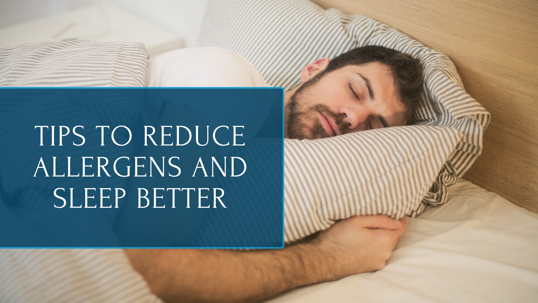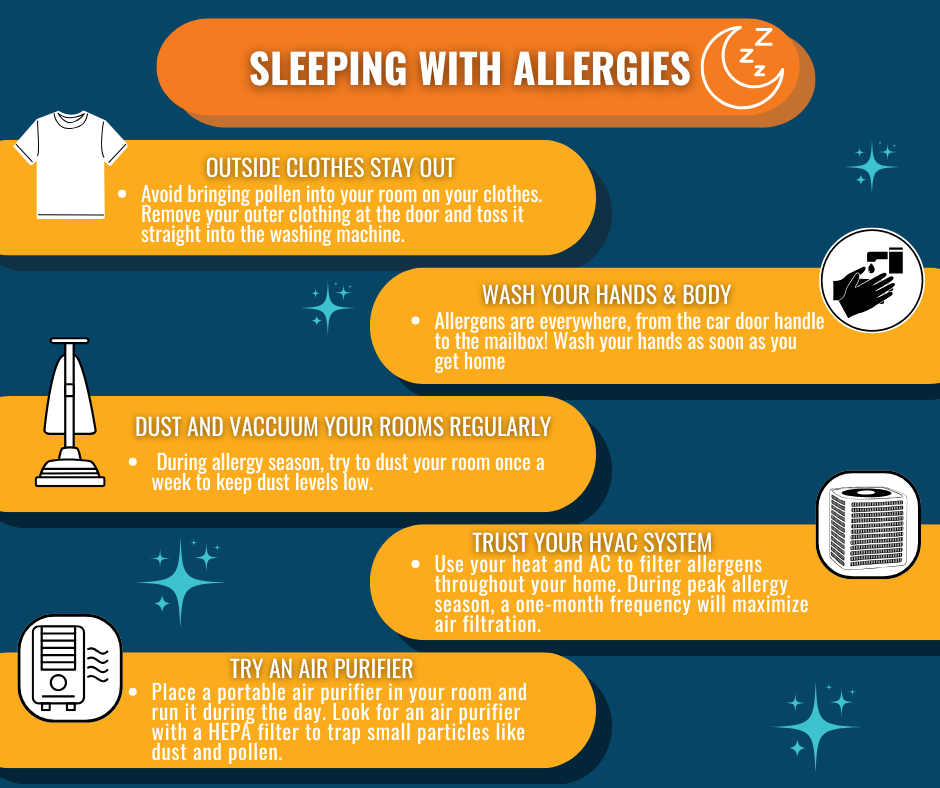Allergy sufferers in Leesburg know the terrors of nighttime allergies: wheezing, coughing, tossing, and turning. But you don’t have to suffer at night if you address the root causes of your symptoms. Learn how to reduce allergens in your bedroom so you can enjoy a restful night’s sleep.
Allergies and Sleep: What’s the Connection?
Considerable research links allergies to unrestful sleep, which contributes not only to daytime fatigue but also to an increased risk ofdeveloping sleep disorders.
Unfortunately, there’s no such thing as an allergy-free home. Pollen, dust, and other airborne irritants are always present. Most of the time, your home’s air filtration system keeps these irritants low. During pollen season, the dry winter months, or if mold and dust mites are left unchecked, the concentration of allergens can increase and cause symptoms in those with allergies.
Do Allergy Symptoms Get Worse at Night?
They can. Allergy symptoms are often worse in the evening when because of:
- Histamine – Histamine is the chemical that triggers allergy symptoms and tends to be present in higher concentrations at night.
- Pollen levels – Pollen brought into your bedroom during the day has had time to accumulate by nighttime, and you may be stirring it up as you prepare for bed.
- Body position – Lying down changes how mucus moves in your sinuses, which can cause mucus to gather in your nasal passages, leading to sneezing and coughing.
- Temperature changes – Temperature and humidity changes may affect nasal mucus production, contributing to irritation and post-nasal drip.
Keep Allergens Out of Your Bedroom
However, there are several steps you can take to reduce the severity of your allergies during peak season. They include:
- Keeping windows and doors closed. During allergy season, keep windows and doors closed, especially from late morning to early evening when pollen levels peak.
- Showering when you get home. Remove your outer layers of clothing right at the door, and take a shower to get pollen off your skin and hair.
- Dusting, vacuuming, and cleaning regularly. Dust and vacuum your bedroom weekly to prevent a build-up of dust, dander, pollen, and other particulates. If you have severe allergies, consider dusting and cleaning every day or every other day at the height of allergy season.
- Keeping pets out of your bedroom. Pet hair and dander are two of the most common indoor allergens. If possible, provide your pet with a cozy place to sleep in a separate room or at least on the bedroom floor, and don’t forget to wash your pet’s bed as frequently as you wash your sheets–weekly!
- Maintaining your HVAC system. A well-maintained HVAC system is one of the most effective tools you have in the fight against allergens. Maintain your system according to the owner's manual and replace its air filter at least every 1-3 months for optimal efficiency.
- Using an air purifier. Air purifiers filter indoor air and improve circulation, lowering the concentration of allergens in your bedroom. Look for a portable air purifier with a HEPA filter, which is rated to trap the smallest airborne particulates.
Read More: How to Improve Indoor Air Quality at Home
Can Sleeping with a Humidifier Help Allergies?
Some individuals benefit from using a humidifier for allergies, but it’s not a universal solution. Humidifiers can thin out mucus and moisturize nasal passages, making breathing easier. However, too much humidity can promote mold and mildew growth, worsening allergies. Keep your home’s humidity level between 30% and 50% for optimal indoor air.
Take On Allergy Season with Help from M.E. Flow, Inc.
Don’t let allergy symptoms slow your roll. Our technicians have been helping northern Virginia homeowners improve the air quality they breathe indoors for years. We have the experience and resources to help you live more comfortably year-round.
Call 571-350-3183 o rcontact us online to schedule HVAC, electrical, or plumbing services in Leesburg, Lorton, Alexandria, and the surrounding areas.


